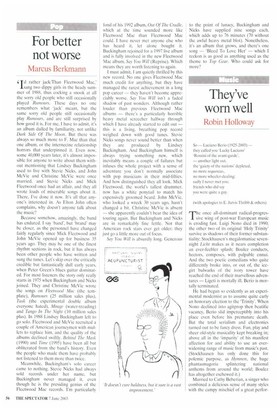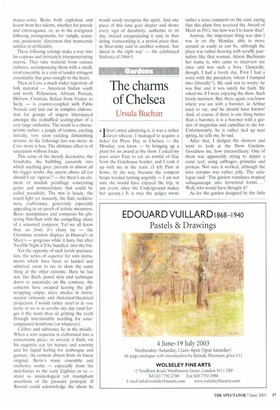They've worn well
Robin Holloway
So — Luciano Berio (1925-2003) — they called you 'Lucky Luciano' 'Rossini of the avant-garde', — another light out, the 'gaiety of the nations' depleted,
no more segteenzas,
no more wheeler-dealing; sadly I never met you; friends who did say you were quite a guy, (with apologies to E. Jarvis Thribh & others)
The once all-dominant radical-progressive wing of post-war European music is eroding fast. Luigi Nono died in 1990; the other two of its original 'Holy Trinity' survive as shadows of their former substantiality; Stockhausen's megalomaniac sevennight Licht makes as it nears completion an ever-feebler splash; Boulez conducts, hectors, composes, with palpable ennui. And the two poetic comedians who quite differently broke into, or out of, the icegirt bulwarks of the ivory tower have reached the end of their marvellous adventures — Ligeti is mortally ill, Berio is mortally terminated.
He had begun so evidently as an experimental modernist as to assume quite early an honorary election to the 'Trinity'. When Nono declined into agitprop then beatific vacancy, Berio slid imperceptibly into his place even before his premature death. But the total scrialism and electronics turned out to be fancy dress. Fun, play and sheer old-style musicality kept breaking in; above all in the 'impurity' of his manifest affection for and ability to use an everwidening range of music from music's past. (Stockhausen has only done this for polemic purpose, as Hyrnnen, the huge phantasmagoria splintering national anthems from around the world; Boulez has altogether eschewed it.) Married to Cathy Beberian, a singer who combined a delicious sense of many styles with the campy mischief of a great perfor mance-artist, Berio both exploited and learnt from her talents, whether for parody and extravagance, or, as in the evergreen folksong arrangements, for 'simple, sensuous, passionate directness that transcends artifice or artificiality, These folksong settings make a way into his copious and intricately interpenetrating oeuvre. They take material from various cultures, accompanying them with a small, vivid ensemble in a vein of tender stringent essentiality that goes straight to the heart.
Then in Coro a much wider repertory of folk material American Indian south and north, Polynesian, African, Persian, Hebrew, Croatian, Italian from Venice to Sicily — is counter-coupled with Pablo Neruda and laid out in complex elaboration for groups of singers interspaced amongst the reshuffled seating-plan of a very large orchestra. The result is a characteristic welter; a jungle of texture, exciting initially, very soon yielding diminishing returns. In the folksongs less was more: in Coro more is less. The ultimate effect is of saturation without focus.
This sense of the merely decorative, the brouhaha, the bubbling casserole into which anything goes, prevails in almost all his bigger works, the operas above all for should I say 'operas'? — for there's an element of modish persiflage concerning genre and nomenclature that could be called pseudish). The mix is heady, the touch light yet masterly, the flair, recklessness, exuberance, generosity especially appealing in an epoch of artistic meanness. Berio manipulates and comperes his glittering flim-flam with the compelling allure of a seasoned conjuror, Yet we all know that, au fond, it's classy tat — the Christmas window displays in Harrod's or Macy's — gorgeous while it lasts, but after Twelfth Night it'll be bundled into the bin.
Yet the opposite of such lavish spectaculars, the series of sequenze for solo instruments which have been so lauded and admired, seem to me to show the same thing at the other extreme. Here he has not. like Bach, pared style and technique down to essentials; on the contrary, the contents have escaped leaving the giftwrapping empty, mere studies in instrumental virtuosity and rhetorical/theatrical projection. I would rather revel in In vera storm a or on re in ascolta any day (and forget it the next) than sit gritting the teeth through interminable nerdling for unaccompanied trombone (or whatever), Calibre and substance lie in the middle. When a solo sequenza is elaborated into a concertante piece, or several, it finds, via his exquisite ear for texture and sonority and his liquid feeling for arabesque and gesture. the content absent from its linear original. Berio's many ensemble and orchestra works — especially from the mid-Sixties to the early Eighties or so — stand as unideological yet triumphant assertions of the pleasure principal. If Rossini could acknowledge the idiom he would surely recognise the spirit. And one piece of this time goes deeper and shows every sign of durability, authentic to its day, indeed encapsulating it and, in thus doing, transcending it, a period piece that, as Stravinsky said in another context, 'has dated in the right way' — the celebrated Sinfonia of 1968-9.











































































 Previous page
Previous page